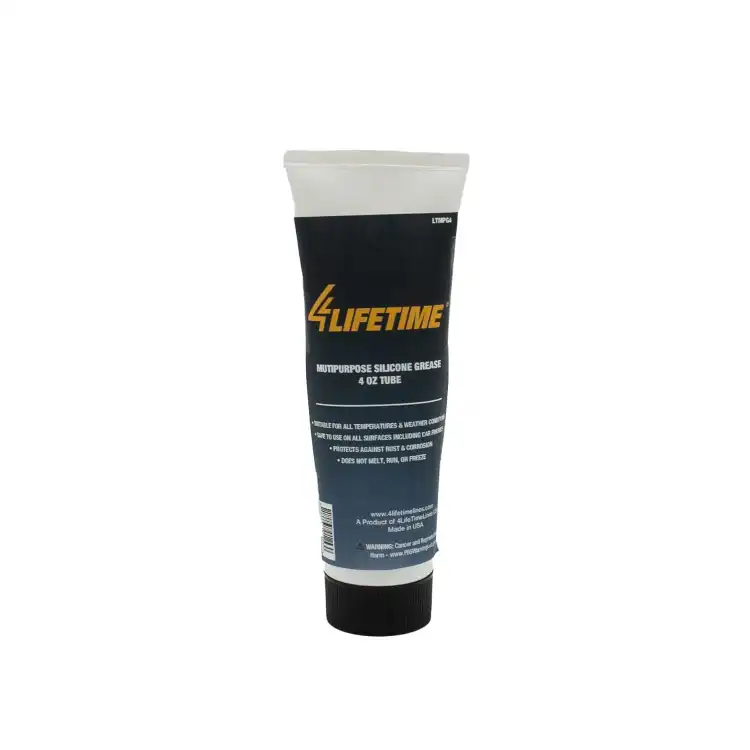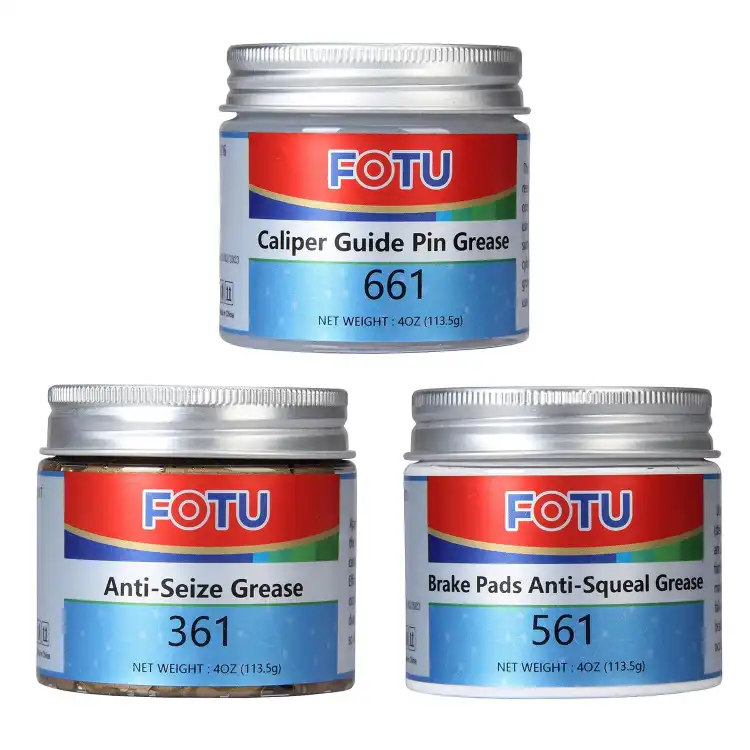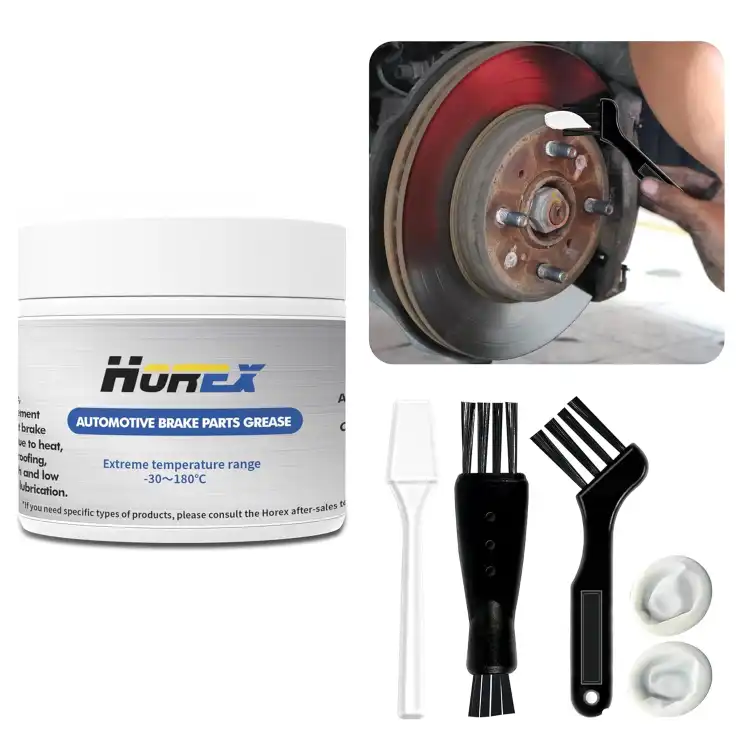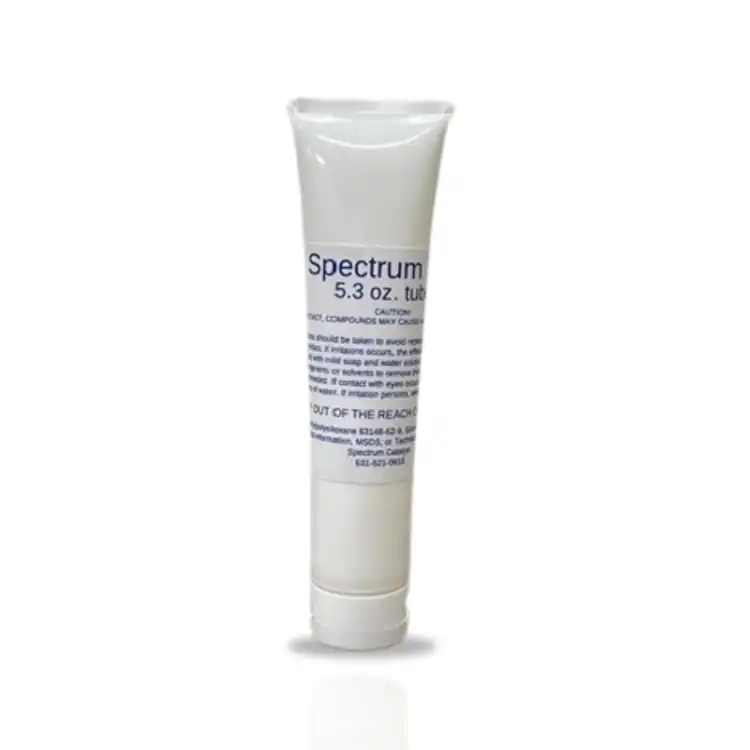Brief Overview of the Importance of Caliper Grease
Caliper grease plays a crucial role in the overall performance and longevity of your vehicle’s braking system. It is a high-performance lubricant specifically designed to reduce friction, prevent sticking, and protect against rust and corrosion in the brake calipers. Without it, the brake calipers, which are responsible for slowing down your vehicle by creating friction with the brake rotors, can become noisy, less effective, and eventually fail.
Caliper grease is not just a luxury or an optional add-on; it is a necessity for every vehicle. It ensures that the brake calipers function smoothly and efficiently, thereby enhancing your vehicle’s safety and performance. Moreover, it can save you from costly repairs and replacements in the long run.
Therefore, understanding the importance of caliper grease, its role in brake performance, the consequences of neglecting it, and how to choose and apply it correctly is essential for every vehicle owner.
Purpose of the Article
This article aims to provide a comprehensive guide on caliper grease. It covers everything you need to know about it, including its role, importance, different types, how to choose and apply it, and much more. Whether you’re a professional mechanic, a car enthusiast, or a regular vehicle owner, this guide will equip you with the knowledge to maintain your brake calipers effectively and ensure your vehicle’s optimum performance and safety.
Our Top Caliper Grease Picks

4LifetimeLines Multi-Purpose Silicone Grease – 4 oz Tube, Brake Grease, Brake Caliper Grease
Check on AmazonKey Specs:
- Material: Silicone
- Volume: 4 fluid ounces
- Application: Automotive, home, farm, and shop
- Performance: All-weather, heat-resistant
- Uses: Brake grease, caliper grease, multi-surface lubrication
4LifetimeLines Multi-Purpose Silicone Grease is my go-to lubricant for a range of applications, especially for brake systems. It excels in all weather conditions, offering excellent heat resistance, which is vital for smooth and efficient braking. Whether I’m using it on brakes, calipers, or other parts, it reduces friction and wear, ensuring long-lasting performance. I love its versatility—ideal for automotive, farm, and even home use. The silicone formula provides superior protection against corrosion while enhancing braking efficiency.

FOTU 661 Brake Caliper Guide Pin Grease
Check on AmazonKey Specs:
- Grease Set: 661, 561, 361
- Material: Silicone, Copper
- Volume: 12 fluid ounces
- Application: Brake calipers, pins, pads
- Purpose: Anti-seize, anti-squeal, high-temperature lubrication
The FOTU Brake Caliper Guide Pin Grease, Anti-Seize Grease, and Brake Pads Anti-Squeal Grease combo is an excellent all-in-one solution for maintaining brake components. The 661 Caliper Guide Pin Grease ensures smooth operation of guide pins, while the 561 Brake Pads Grease eliminates squeaks and reduces wear. The 361 Copper Anti-Seize Grease offers superior heat resistance and prevents seizing in high-temperature environments. I rely on this set for a quieter, smoother braking system and enhanced longevity of brake parts.

Automotive Brake Parts Grease 50g Extreme Ceramic Caliper
Check on AmazonKey Specs:
- Volume: 50 grams (5E+1 milliliters)
- Temperature Range: -30℃ to 180℃ (-22℉ to 356℉)
- Application: Compatible with ceramic and metal brake pads, guide pins, calipers, and sleeves
- Included Tools: Finger-cots (2), double-headed brush (1), scraper (1), single-headed brush (1)
- Brand: Horex
The Horex Automotive Brake Parts Grease is a game-changer for maintaining brake systems. Its high-temperature resistance (up to 356℉) ensures effective lubrication even in harsh conditions, preventing wear, rust, and abnormal noise. I appreciate its compatibility with both ceramic and metal brake pads, making it versatile for all types of vehicles. The included tools, like the brushes and scraper, make application clean and easy, offering a comprehensive solution for brake maintenance and longevity.

Spectrum 777 Dielectric Silicone Lubricant & Sealant
Check on AmazonKey Specs:
- Size: 5.3 oz (150.25 grams)
- Temperature Range: -40°F to 400°F (-40°C to 204°C)
- Applications: Brake calipers, electrical connections, O-rings, gaskets, vacuum systems
- Chemical Resistance: Resists mineral oils, vegetable oils, dilute acids, and alkaline solutions
- Shelf Life: Up to 60 months under normal conditions
Spectrum 777 Dielectric Silicone Lubricant & Sealant stands out for its exceptional versatility and high-performance capabilities. Its superior dielectric properties make it ideal for high-voltage and underground electrical connections, ensuring excellent insulation. I love how it maintains optimal performance in extreme temperatures, from -40 to 400°F, and provides a robust moisture barrier. It’s perfect for brake calipers, gaskets, and O-rings. The long shelf life ensures reliability over time, making it an essential tool for many applications, from electrical to mechanical needs.
Understanding Brake Calipers
Definition and Function of Brake Calipers
Brake calipers are a vital component of your vehicle’s disc braking system. They are essentially a clamp that houses the brake pads and pistons. When you apply the brakes, hydraulic pressure forces the pistons to push the brake pads against the brake rotors, creating friction that slows down or stops your vehicle.
Brake calipers come in different types, including floating (or sliding) calipers and fixed calipers. Floating calipers move in and out relative to the rotor, while fixed calipers have pistons on both sides of the rotor. Regardless of the type, all brake calipers work on the same principle of creating friction to slow down or stop the vehicle.
Therefore, brake calipers play a direct role in your vehicle’s braking performance and safety. Any issue with them can affect your ability to slow down or stop your vehicle effectively, posing a serious safety risk.
Importance of Maintaining Brake Calipers
Given their crucial role, maintaining brake calipers in good working condition is of utmost importance. Over time, they can suffer from various issues, such as sticking, uneven brake pad wear, and rust and corrosion, mainly due to heat, dirt, and moisture. These issues can reduce their effectiveness, leading to poor braking performance and increased stopping distances.
Regular maintenance of brake calipers, including cleaning, inspection, and lubrication with caliper grease, can prevent these issues. It ensures that they function smoothly and efficiently, providing consistent and reliable braking performance. Moreover, it extends their lifespan, saving you from costly repairs or replacements.
Therefore, neglecting brake caliper maintenance can lead to serious safety risks and financial implications. It is a small price to pay for your safety and peace of mind.
The Role of Caliper Grease
Explanation of What Caliper Grease Is
Caliper grease, also known as brake grease, is a high-performance lubricant specifically designed for brake calipers. It is typically made of synthetic or silicone-based compounds that can withstand the high temperatures and harsh conditions within the braking system. It may also contain anti-wear and anti-corrosion additives to protect the brake calipers and other components.
Caliper grease is not the same as regular automotive grease. While regular grease can melt or break down under high temperatures, caliper grease can resist temperatures up to 600 degrees Fahrenheit or even higher. Moreover, it is compatible with rubber and plastic components, such as seals and boots, which regular grease can damage.
Therefore, using the right type of grease is crucial for the effective lubrication and protection of brake calipers.
How Caliper Grease Contributes to Brake Performance
Caliper grease contributes to brake performance in several ways. First, it reduces friction between the moving parts of the brake calipers, such as the pistons and slides. This ensures smooth and efficient operation, leading to consistent and reliable braking performance.
Second, it prevents sticking of the brake pads and pistons, which can cause issues such as uneven brake pad wear and poor braking performance. By ensuring that these components move freely, it enhances the responsiveness and effectiveness of the brakes.
Third, it protects against rust and corrosion, which can damage the brake calipers and other components. This extends their lifespan and saves you from costly repairs or replacements.
Therefore, caliper grease plays a direct role in maintaining your vehicle’s braking performance and safety. Neglecting it can lead to various issues, affecting your ability to slow down or stop your vehicle effectively.
The Consequences of Neglecting Caliper Grease
Potential Damage to Brake System
Neglecting caliper grease can lead to various issues in the brake system. Without proper lubrication, the moving parts of the brake calipers can experience increased friction, leading to wear and tear. This can reduce their effectiveness, leading to poor braking performance and increased stopping distances.
Moreover, without the protective layer of grease, the brake calipers and other components can become susceptible to rust and corrosion. This can cause them to seize or fail, requiring costly repairs or replacements. In severe cases, it can even lead to brake failure, posing a serious safety risk.
Therefore, regular application of caliper grease is crucial for the health and longevity of your brake system. It is a small investment that can save you from big troubles down the road.
Safety Risks Associated with Poor Brake Maintenance
Poor brake maintenance, including neglecting caliper grease, can pose serious safety risks. As mentioned earlier, it can lead to various issues, such as poor braking performance, increased stopping distances, and even brake failure. These issues can affect your ability to slow down or stop your vehicle effectively, increasing the risk of accidents.
Moreover, issues such as sticking brake pads and pistons can cause the brakes to overheat, leading to brake fade. This is a condition where the brakes lose their effectiveness due to excessive heat, making it harder to slow down or stop the vehicle. In severe cases, it can lead to total brake failure, posing a serious safety risk.
Therefore, regular brake maintenance, including the application of caliper grease, is not just about maintaining your vehicle’s performance and longevity; it’s about ensuring your safety and the safety of others on the road.
Different Types of Caliper Grease
Synthetic Caliper Grease
Synthetic caliper grease is a high-performance lubricant made of synthetic compounds. It is designed to withstand the high temperatures and harsh conditions within the braking system. It offers excellent lubrication, reduces friction, prevents sticking, and protects against rust and corrosion.
Synthetic caliper grease is compatible with rubber and plastic components, such as seals and boots, making it safe for use in all parts of the brake calipers. Moreover, it is resistant to water and moisture, ensuring long-lasting protection.
However, synthetic caliper grease can be more expensive than other types. But considering its performance and benefits, it is a worthwhile investment for the health and longevity of your brake system.
Ceramic Caliper Grease
Ceramic caliper grease is another high-performance lubricant designed for brake calipers. It is made of ceramic particles suspended in a synthetic grease base. The ceramic particles provide excellent heat resistance, making it ideal for high-performance and heavy-duty applications.
Ceramic caliper grease offers excellent lubrication, reduces friction, prevents sticking, and protects against rust and corrosion. It is also compatible with rubber and plastic components, making it safe for use in all parts of the brake calipers.
Like synthetic caliper grease, ceramic caliper grease can be more expensive than other types. But its superior heat resistance and performance make it a popular choice among professionals and enthusiasts.
Silicone Caliper Grease
Silicone caliper grease is a high-performance lubricant made of silicone compounds. It is designed to withstand high temperatures and harsh conditions within the braking system. It offers good lubrication, reduces friction, prevents sticking, and protects against rust and corrosion.
Silicone caliper grease is compatible with rubber and plastic components, making it safe for use in all parts of the brake calipers. Moreover, it is resistant to water and moisture, ensuring long-lasting protection.
However, silicone caliper grease may not offer the same level of heat resistance as synthetic or ceramic caliper grease. But it is usually cheaper, making it a good option for budget-conscious vehicle owners.
Factors to Consider When Buying Caliper Grease
Type of Vehicle
The type of vehicle is an important factor to consider when buying caliper grease. Different vehicles have different braking systems and requirements. For example, high-performance vehicles and heavy-duty trucks generate more heat in the brakes, requiring a caliper grease with higher heat resistance. On the other hand, regular passenger cars may not require such high-performance grease.
Moreover, some vehicles may have specific requirements or recommendations for caliper grease. For example, some manufacturers may recommend a specific type or brand of grease for their vehicles. Therefore, it is always a good idea to check your vehicle’s manual or consult with a professional before choosing a caliper grease.
Climate and Driving Conditions
The climate and driving conditions can also affect the choice of caliper grease. In hot climates or high-performance driving conditions, the brakes generate more heat, requiring a caliper grease with higher heat resistance. On the other hand, in cold climates or normal driving conditions, a regular caliper grease may suffice.
Moreover, in wet or salty conditions, the brakes are more susceptible to rust and corrosion, requiring a caliper grease with good anti-corrosion properties. Therefore, consider your climate and driving conditions when choosing a caliper grease.
Price and Quality
Price and quality are also important factors to consider when buying caliper grease. While it may be tempting to go for the cheapest option, it may not always be the best choice. Cheap caliper grease may not offer the same level of performance and protection as higher-quality ones. It may not withstand high temperatures, provide adequate lubrication, or protect against rust and corrosion.
On the other hand, expensive caliper grease does not always mean better quality. Some brands may charge a premium for their name, not their product. Therefore, it is important to do your research, read reviews, and compare products before making a decision.
Remember, caliper grease is a small investment for the health and longevity of your brake system. It is better to spend a little more on a good-quality product than to save a few bucks and risk damaging your brakes.
Top Caliper Grease Brands
Brief Overview of Top Brands
There are several brands that are well-known for their high-quality caliper grease. These include Permatex, CRC, and ATE. These brands offer a range of products to suit different needs and budgets.
Permatex is a leading brand in automotive maintenance products. Their Synthetic Brake Lubricant is a popular choice for its excellent performance and value for money. It offers superior lubrication, high-temperature resistance, and protection against rust and corrosion.
CRC is another reputable brand in the automotive industry. Their Brake Caliper Synthetic Grease is known for its high-temperature resistance and long-lasting protection. It is also compatible with rubber and plastic components, making it safe for use in all parts of the brake calipers.
ATE is a premium brand that offers high-quality brake fluids and lubricants. Their Plastilube Brake Lubricant is a high-performance product that provides excellent lubrication and protection. It is also free of copper and acids, making it safe for all materials in the braking system.
Comparison of Their Products
While all these brands offer high-quality caliper grease, there are some differences in their products. For example, Permatex’s Synthetic Brake Lubricant is a synthetic grease that offers excellent performance and value for money. It is a good choice for most vehicles and conditions.
CRC’s Brake Caliper Synthetic Grease, on the other hand, offers superior high-temperature resistance, making it ideal for high-performance vehicles and heavy-duty applications. However, it is slightly more expensive than Permatex’s product.
ATE’s Plastilube Brake Lubricant is a premium product that offers excellent lubrication and protection. It is also free of copper and acids, making it safe for all materials in the braking system. However, it is the most expensive of the three.
Therefore, the best caliper grease for you depends on your specific needs and budget. All these products are excellent choices, and you can’t go wrong with any of them.
Detailed Reviews of Top Caliper Grease Products
Product Specifications
Permatex’s Synthetic Brake Lubricant comes in a 3 oz. tube. It is a synthetic grease that can withstand temperatures up to 600 degrees Fahrenheit. It offers superior lubrication, high-temperature resistance, and protection against rust and corrosion. It is also compatible with rubber and plastic components.
CRC’s Brake Caliper Synthetic Grease comes in a 2.5 oz. tube. It is a synthetic grease that can withstand temperatures up to 700 degrees Fahrenheit. It offers superior high-temperature resistance and long-lasting protection. It is also compatible with rubber and plastic components.
ATE’s Plastilube Brake Lubricant comes in a 75 ml tube. It is a high-performance lubricant that provides excellent lubrication and protection. It is free of copper and acids, making it safe for all materials in the braking system.
Pros and Cons
Permatex’s Synthetic Brake Lubricant offers excellent performance and value for money. It is a good choice for most vehicles and conditions. However, it may not offer the same level of high-temperature resistance as other products.
CRC’s Brake Caliper Synthetic Grease offers superior high-temperature resistance, making it ideal for high-performance vehicles and heavy-duty applications. However, it is slightly more expensive than other products.
ATE’s Plastilube Brake Lubricant offers excellent lubrication and protection. It is safe for all materials in the braking system. However, it is the most expensive of the three.
User Reviews
Users have praised Permatex’s Synthetic Brake Lubricant for its excellent performance and value for money. They have reported that it reduces brake noise, improves performance, and extends the life of the brake components.
Users have also praised CRC’s Brake Caliper Synthetic Grease for its superior high-temperature resistance. They have reported that it provides long-lasting protection and improves brake performance.
Users have praised ATE’s Plastilube Brake Lubricant for its excellent lubrication and protection. They have reported that it reduces brake noise and improves performance. However, some users have noted that it is more expensive than other products.
How to Apply Caliper Grease
Step-by-Step Guide
Applying caliper grease is a relatively simple process that you can do yourself. Here is a step-by-step guide:
1. First, you need to remove the brake calipers. This usually involves removing the wheel, loosening the caliper bolts, and sliding the caliper off the rotor.
2. Once the caliper is removed, clean it thoroughly. You can use a brake cleaner to remove dirt, grease, and brake dust. Make sure to clean the caliper pins, slides, and piston.
3. After cleaning, apply a thin layer of caliper grease to the caliper pins, slides, and piston. Make sure to cover all the moving parts, but avoid getting grease on the brake pads or rotor.
4. Once the grease is applied, reassemble the brake calipers. Make sure to tighten the caliper bolts to the correct torque.
5. Finally, test the brakes to make sure they are working properly. You should notice a reduction in brake noise and an improvement in performance.
Safety Precautions
While applying caliper grease is a relatively simple process, there are some safety precautions you should take:
1. Always wear safety glasses and gloves to protect your eyes and skin from the grease and brake dust.
2. Use a jack stand to support the vehicle when removing the wheel and brake calipers. Never rely on the jack alone, as it can fail and cause the vehicle to fall.
3. Avoid getting grease on the brake pads or rotor, as it can reduce their friction and affect the braking performance.
4. Always tighten the caliper bolts to the correct torque to ensure the calipers are secure.
5. Dispose of used grease and brake cleaner properly. Do not pour them down the drain or into the ground.
Frequency of Caliper Grease Application
Recommended Frequency by Experts
Experts recommend applying caliper grease every time you replace the brake pads, which is typically every 30,000 to 70,000 miles, depending on your driving conditions and habits. However, if you notice issues such as brake noise or poor performance, you may need to apply it more frequently.
Applying caliper grease is a relatively simple and inexpensive process that can greatly improve your braking performance and extend the life of your brake components. Therefore, it is a good practice to include it in your regular brake maintenance.
Signs That Your Caliper Needs Greasing
There are several signs that your caliper may need greasing. These include:
1. Brake Noise: If you hear a squeaking or squealing noise when you apply the brakes, it may be due to lack of lubrication. Applying caliper grease can reduce the noise and improve the performance.
2. Poor Braking Performance: If you notice a decrease in braking performance, such as longer stopping distances or less responsive brakes, it may be due to lack of lubrication. Applying caliper grease can improve the performance and responsiveness of the brakes.
3. Uneven Brake Pad Wear: If you notice uneven wear on the brake pads, it may be due to sticking caliper pins or pistons. Applying caliper grease can ensure they move freely and evenly distribute the pressure on the brake pads.
4. Rust and Corrosion: If you notice rust or corrosion on the brake calipers, it may be due to lack of protection. Applying caliper grease can protect against rust and corrosion and extend the life of the brake components.
Common Mistakes When Applying Caliper Grease
Over-Application
One of the common mistakes when applying caliper grease is over-application. While it is important to cover all the moving parts, applying too much grease can cause it to spill over onto the brake pads or rotor, reducing their friction and affecting the braking performance.
Moreover, excess grease can attract dirt and dust, which can cause wear and tear on the brake components. Therefore, it is important to apply a thin layer of grease, just enough to cover the parts.
Using the Wrong Type of Grease
Another common mistake is using the wrong type of grease. As mentioned earlier, caliper grease is not the same as regular automotive grease. It is specifically designed to withstand the high temperatures and harsh conditions within the braking system.
Using regular grease can cause it to melt or break down under high temperatures, leading to lack of lubrication and potential damage to the brake components.
